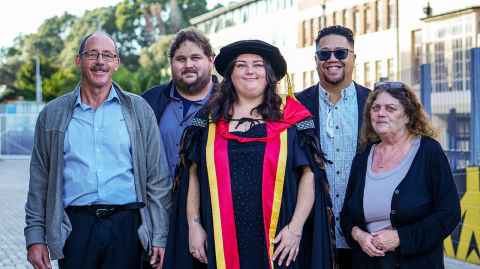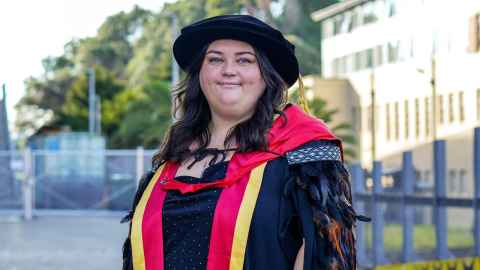Ashlea Gillon: how are we talking about fat bodies?
14 May 2025
In her confronting research thesis, Dr Ash Gillon prompted people to think and talk about fat bodies differently.

When Dr Ash Gillon (Ngāti Awa, Ngāpuhi, Ngāiterangi) speaks about fatness, it’s never just about the body. It’s about systems of oppression and truth.
For her groundbreaking PhD thesis at Waipapa Taumata Rau, University of Auckland, Ash invited people to think differently – especially about how society treats fat wāhine Māori.
After 15 years of academic study – a BA in Māori Studies and Sociology, a graduate diploma, and postgraduate diploma in Māori Health, and a masters in Public Health – Ash now has her PhD, pushing the boundaries of fat studies and kaupapa Māori research.
Her thesis, grounded entirely in a mātauranga Māori worldview, is a first of its kind: a research journey anchored in Māori narratives, values, and resistance.
“Fat Indigenous wāhine are subject to multiple forms of discrimination and intersecting oppressions,” Ash says. “Fat wāhine Māori are presented as undeserving, unwell, diseased, undesirable, and unreliable.”
But Ash flips the script: “We are deserving, well, eased, desirable, reliable.”
“The system, as it stands, and as it has been for a long time, perpetuates how (in)access is enabled for some groups and not others through biopower, biopolitics, healthism, racism, sexism and fatism.”
Ash's road to her PhD has involved plenty of challenges. She grew up Mt Roskill with her parents and two older brothers in a two-bedroom state house, and attended Lynfield College.
She is the first in her immediate family to go to University and it took a while to find her feet.
"I'd enrolled in my undergrad with an English
major for two years before I realised I wanted to do Māori Studies."
That's when her learning took off.
"I had a fabulous department and tuakana and Māori lecturers and advisers who believed in me and got me enrolled straight away for a masters programme."
One that was ticked off, the path was clear.
"I knew the only way I could do a PhD was if I got an A and got the guaranteed scholarship. So, once I received my A grade and first-class honours, I applied for a PhD.
"But I was (and still am) a very chronically ill person. I was in and out of hospital my entire childhood and teenage years with chronic steroid-dependent asthma and all the complications that come with that, so I wasn’t even sure I would finish high school, get NCEA, or UE.
"But my Mum and I did the hard work to keep me alive; we are very stubborn. And here we are."
At the heart of Ash's research is the powerful atua (goddess) Hine-nui-te-pō, whose pūrākau – along with those of Papatūānuku and Hinemoana – help reclaim body sovereignty for Indigenous women.
Ash describes this research methodology as a “fierce critique of the systems that continue to oppress Māori bodies”.

She describes her chapters as transformations – one, titled 'Becoming Hine-nui-te-pō', explores reclamation of orgasm, good sexual experiences, and the ways wāhine push back against colonial and fatphobic ideas of undesirability.
Another chapter, 'Becoming or Unbecoming Te Pō', is a deeply personal and collective inquiry into potential and what body sovereignty truly means for the wāhine who shared their kōrero.
“I tried to, as much as possible, embody Hine-nui-te-pō, especially with my data. Some may say I didn’t use a critical method of analysis, and that’s because I chose to create my own.
"The kind of work that I do is about the ways in which systems of oppression impact our access to living our best, most well, lives. A lot of whānau illness happened along the way during my time at university, particularly during my PhD. I write a lot about this in my PhD, about undertaking research that is lived whānau experience, watching our health system harm my whānau, perpetuate negligence and racism. All of that while researching in this space has been difficult."
She says universities often don't take into account the complexity of Indigenous lives and "life happening".
"That was a big challenge."
At the same time, Ash acknowledges the incredible support she has had.
"I have been extremely privileged to have amazing wāhine Māori tuakana who actively supported me, guided me, gave me jobs and opportunities, and had time, space, compassion, and capacity for me, despite having no capacity!"
Among those she acknowledges for their guidance are associate professors Donne Cormack, Anneka Anderson and Sarah-Jane Paine as well as Professor Papaarangi Reid, who all supported her in her postgrad and masters,. Then Professors Tracey McIntosh and Melinda Webber, Dr Jade Le Grice and the late Dr Cat Pausé supervised and advised her for her PhD.
The significance of Hine-nui-te-pō
Hine-nui-te-pō, in Māori cosmology, is one of the earliest examples of body sovereignty and reclamation, Ash says.
After discovering she had been deceived by her father, Tāne, and had sexual relations with him, she chose to leave the world of light and descend into the underworld, transforming herself into the atua of death, the underworld, and transition.
This act of self-determination reflects immense mana and autonomy, marking her as one of the most powerful and wise atua in the Māori pantheon. She is commonly associated with the pīwakawaka (fantail) and the moko (lizard) – the latter being the form taken by the demigod Māui in his attempt to steal immortality for humankind.
According to some traditions, Māui tried to enter Hine-nui-te-pō’s body while she slept, but was disturbed by the cry of the pīwakawaka, waking her. In response, she crushed him to death, marking not only his failure but a turning point in the balance of power.
Hine-nui-te-pō, representing Māori wāhine; pīwakawaka as tohu or messenger; and Māui as representation of systems, is largely integrated in Ash’s research as a
foundation.
For Ash, analysis wasn’t about pulling wāhine apart – it was about holding their stories whole.
“Their kōrero was already critical. They’d done the analysis. I was just the kaitiaki.
“I didn’t want to point out what might be seen as problematic in their experiences, because that takes the focus off the system, and places blame on the individual. And that’s not what this is.”
The research doesn’t just sit in theory, but also speaks directly to the everyday realities of fat Māori women navigating a health system that was never designed for them. It asks: what does it mean to be seen as undeserving of care, simply for the size of your body? How do we hold our mana tinana when the system tells us we are too much – or not enough?
Ash has continued this work through a 2023 Health Research Council grant, expanding her focus to fatness and fat bias in health spaces across all Māori.
“The PhD laid the foundation for this,” she says. “But I could easily just work with my PhD for the rest of my life and be joyfully full – because those stories were a gift.”
She’s spoken with 25 Māori so far in the current project, all of whom reveal the ongoing trauma fat people face in the very places meant to care for them.
“There’s this belief that fat people are to blame for our own bodies, that we’re lazy, immoral, undeserving. And health professionals, consciously or not, act on those beliefs.
"If a fat Māori woman presents at a clinic, she might be told to lose weight before she’s listened to. If she doesn’t want to, or can’t, she is seen as non-compliant.
“There’s a lot of frustration in that. Health and healthcare is a right, not a reward for fitting a certain look.”
And when you layer in being Māori, and wahine Māori, the bias multiplies.
“So many wāhine are told to just take a Panadol, go lie down, go lose weight,” she says. “That doesn’t reinforce our worth. It erases it.”
Ash’s research also calls for cultural, political, and spiritual transformation, and integrating kaupapa Māori research methodologies has given Ash the language to redefine mana for fat people.
“Kaupapa Māori is not just a methodology. It’s a commitment. A radical refusal to let Pākehā systems continue to shape our narratives, our health, or our bodies.”
“Fat is just a word, it's a descriptor. It doesn't have that negativity put upon it that we know does exist. And so, for me, it is what it is – I'm fat.”
She ends her PhD with a wero – a set of questions for all of us:
• Do you have fat people in your life?
• Do you think about their needs and accessibility when you choose a venue, a seat, a clinic?
• Do you see their humanity beyond their size?
• Are you supporting nourishment, or promoting restriction?
• Are your spaces – physical and relational – safe for fat Indigenous bodies?
Media contact
Te Rina Triponel | Kaitohutohu Pāpāho Māori
E: te.rina.triponel@auckland.ac.nz